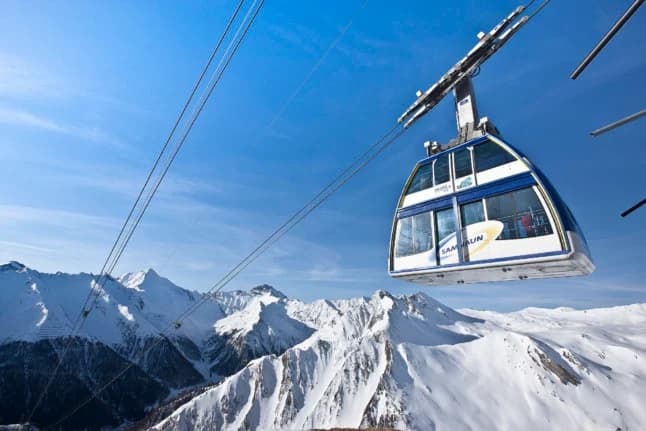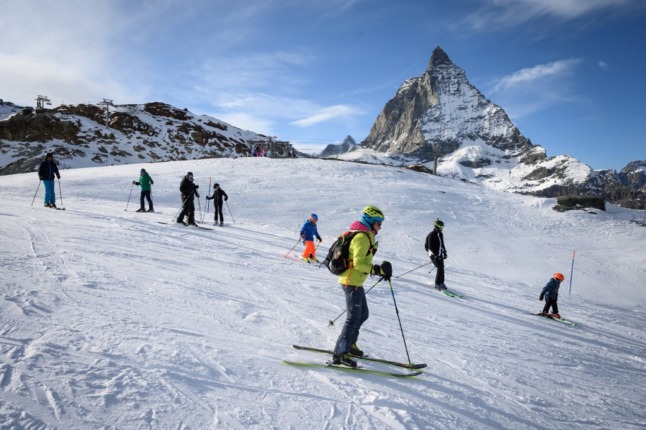Cross-border skiing: What do Swiss residents need to ski in neighbouring countries?

A number of Switzerland’s slopes adjoin those of its neighbours, which have their own rules pertaining to Covid certificates. This is what you should know if you want to ski in those border areas.
In the good old days before Covid, skiers could dash down the slopes of a neighbouring country without a care in the world.
They could have breakfast in Switzerland, ski to France and have lunch there, and then ski back to the Swiss side for dinner. This was a common practice in the adjoining Swiss-Italian and Swiss-Austrian ski areas as well.
But the pandemic changed all that.
This year, Covid certificate is not required to ski in Swiss resorts, although if you are arriving from a foreign country, rules are in place to enter Switzerland.
READ MORE: UPDATE: What are the current rules for entering Switzerland?
While skiing, a certificate is only compulsory to enter inside restaurants and bars, but you don’t need it if you eat in outdoor areas.
However, it will be necessary to juggle various health constraints if you are planning to ski over to a neighbour country.
France
Switzerland and France share a vast ski area called Portes du Soleil, which includes 12 resorts, approximately 650 km of slopes (278 pistes) and more than 200 ski lifts.
One of the attractions of skiing in this region is that you can hit two countries in one day.
But as the health pass is compulsory in ski resorts in France, you will have to take your Covid certificate with you. Swiss Covid certificate is recognised throughout the EU.
These are the latest rules: the pass sanitaire is required to ride on ski lifts, and to enter restaurants, bars etc. Adults over the age of 12 must show proof that they are fully vaccinated (with both doses of a double.dose vaccine), or take a PCR or antigen test every 24 hours.
Italy
The Zermatt / Breuil-Cervinia / Valtournenche - Matterhorn ski area is located in Switzerland Valais region and Italy’s Valle d'Aosta.
There are 322 km of slopes and 52 lifts in the common domain.

One side of the Matterhorn is Switzerland, the other Italy. Photo by Fabrice COFFRINI / AFP
Italy just launched what it calls the “super green pass” — a reinforced version of the Green Pass certificate that proves the holder has been vaccinated against Covid, recovered within the last six months, or tested negative in the last 48 hours.
Essentially, this means that for adults, showing proof of a recent negative test will no longer be enough to ride ski lifts, travel on trains, eat in indoor settings, or drink in bars. A valid super green pass will also be required to buy lift tickets.
Austria
The Ischgl / Samnaun - Silvretta Arena ski area is located in Paznaun-Ischgl on the Austrian side and in the on the Engadin Samnaun Val Müstair side of Switzerland’s Graubünden.
There are 239 km of slopes and 41 lifts in this border area.
However, the country is currently in lockdown and all ski lifts are closed.
The hope is that restrictions will be lifted on December 13th and ski areas will be allowed to reopen, but nothing is certain at this point.
When it does reopen, it is more than likely that Austria will maintain the "2-G-rule" in place. Essentially, this means only proof of vaccination – or proof of recent recovery from infection – will get you the green pass that you need to be able to ride lifts. Unlike France, getting regular negative tests will not be accepted as a substitute.
READ MORE: ‘2G’: Will Switzerland further tighten the Covid certificate?
Comments
See Also
In the good old days before Covid, skiers could dash down the slopes of a neighbouring country without a care in the world.
They could have breakfast in Switzerland, ski to France and have lunch there, and then ski back to the Swiss side for dinner. This was a common practice in the adjoining Swiss-Italian and Swiss-Austrian ski areas as well.
But the pandemic changed all that.
This year, Covid certificate is not required to ski in Swiss resorts, although if you are arriving from a foreign country, rules are in place to enter Switzerland.
READ MORE: UPDATE: What are the current rules for entering Switzerland?
While skiing, a certificate is only compulsory to enter inside restaurants and bars, but you don’t need it if you eat in outdoor areas.
However, it will be necessary to juggle various health constraints if you are planning to ski over to a neighbour country.
France
Switzerland and France share a vast ski area called Portes du Soleil, which includes 12 resorts, approximately 650 km of slopes (278 pistes) and more than 200 ski lifts.
One of the attractions of skiing in this region is that you can hit two countries in one day.
But as the health pass is compulsory in ski resorts in France, you will have to take your Covid certificate with you. Swiss Covid certificate is recognised throughout the EU.
These are the latest rules: the pass sanitaire is required to ride on ski lifts, and to enter restaurants, bars etc. Adults over the age of 12 must show proof that they are fully vaccinated (with both doses of a double.dose vaccine), or take a PCR or antigen test every 24 hours.
Italy
The Zermatt / Breuil-Cervinia / Valtournenche - Matterhorn ski area is located in Switzerland Valais region and Italy’s Valle d'Aosta.
There are 322 km of slopes and 52 lifts in the common domain.

Italy just launched what it calls the “super green pass” — a reinforced version of the Green Pass certificate that proves the holder has been vaccinated against Covid, recovered within the last six months, or tested negative in the last 48 hours.
Essentially, this means that for adults, showing proof of a recent negative test will no longer be enough to ride ski lifts, travel on trains, eat in indoor settings, or drink in bars. A valid super green pass will also be required to buy lift tickets.
Austria
The Ischgl / Samnaun - Silvretta Arena ski area is located in Paznaun-Ischgl on the Austrian side and in the on the Engadin Samnaun Val Müstair side of Switzerland’s Graubünden.
There are 239 km of slopes and 41 lifts in this border area.
However, the country is currently in lockdown and all ski lifts are closed.
The hope is that restrictions will be lifted on December 13th and ski areas will be allowed to reopen, but nothing is certain at this point.
When it does reopen, it is more than likely that Austria will maintain the "2-G-rule" in place. Essentially, this means only proof of vaccination – or proof of recent recovery from infection – will get you the green pass that you need to be able to ride lifts. Unlike France, getting regular negative tests will not be accepted as a substitute.
READ MORE: ‘2G’: Will Switzerland further tighten the Covid certificate?
Join the conversation in our comments section below. Share your own views and experience and if you have a question or suggestion for our journalists then email us at [email protected].
Please keep comments civil, constructive and on topic – and make sure to read our terms of use before getting involved.
Please log in here to leave a comment.